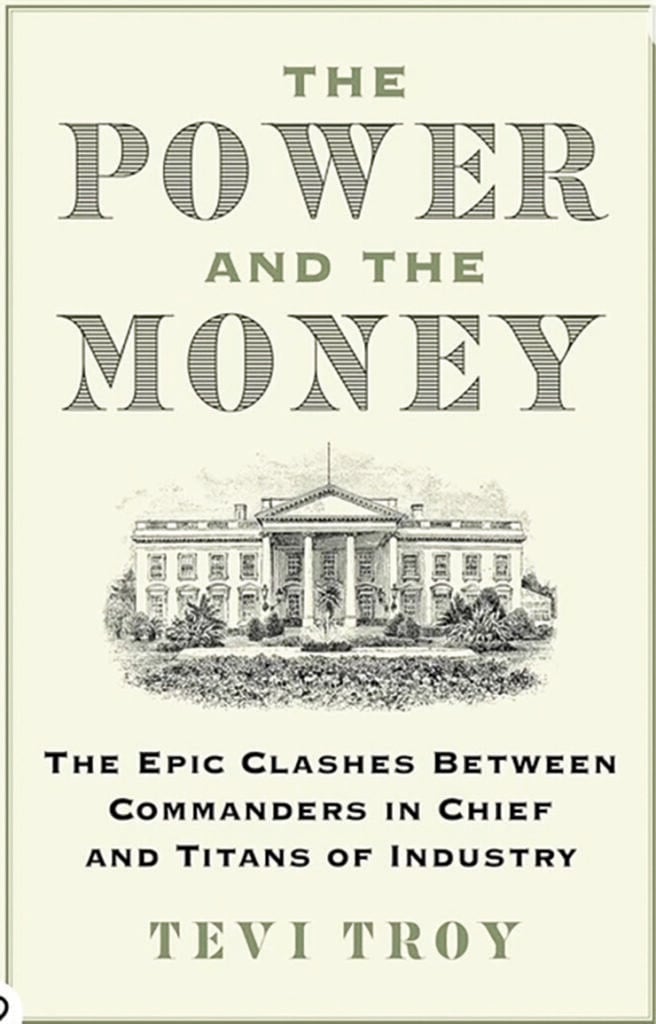
Highlighting: “The Power and the Money: The Epic Clashes Between Commanders in Chief and Titans of Industry” by Tevi Troy. Regnery History. 2024. Hardcover. 368 pages. ISBN-13:978-1684515400.
(Courtesy of YU) Highly readable, frighteningly relevant and a must for history buffs, “The Power and the Money: The Epic Clashes Between Commanders in Chief and Titans of Industry,” published in September, illustrates the often complicated, sometimes antagonistic but increasingly inevitable relationships that develop among corporate titans and U.S. presidents.
“Tevi Troy does for presidential history what Stephen King did for horror: his books shock and entertain,” noted one reviewer.
Indeed, this latest book from Dr. Tevi Troy — bestselling presidential historian, political scholar and an Orthodox Jew who held high-level posts in the second Bush administration, has earned him praise from across the political spectrum, from The New York Times, The Economist and Politico to The Wall Street Journal and The Jerusalem Post, not to mention guest spots on countless podcasts. As National Review noted: “The publication of a new book by Tevi Troy is always an important occasion.”
“The Power and the Money” examines the evolving relationship between U.S. presidents and CEOs, from Ulysses S. Grant and J.P. Morgan to Joe Biden and Elon Musk. Troy skillfully weaves rich anecdotes with analysis, illustrating how these interactions reveal both the reach and limits of executive power.

And as the relationship between politicians and powerful CEOs — like Mark Zuckerberg, who is profiled in the book — deepens, “The Power and the Money” feels more relevant than ever. “What’s happening today aligns with the themes in my book about the deep entanglement between government and business,” explained Troy, the inaugural Senior Scholar and Impact Office Director of Yeshiva University’s Zahava & Moshael Straus Center for Torah & Western Thought. “They’re inseparable, and increasingly reliant on each other. This enmeshment has grown to the point where both are dominant forces in American life in ways they weren’t 150 years ago.”
The book also relates, indirectly, to Jews. Of the 18 CEOs that Troy profiled, five are Jewish, a reflection of the outsized impact Jews have had on American life. “America has been a place where Jews have been able to flourish and contribute to building a better country.”
In addition to his work as an author and policy advisor, Troy now teaches YU undergraduate courses on health policy and the presidency and leads a Straus Center student reading group, delving into topics such as American Jewish political thinkers and great political speeches.
“My goal is to help shape well-rounded, thoughtful Jewish students who can think critically, write effectively, and understand history,” Troy said. “By building relationships with these students, I hope to guide them toward becoming the next generation of Jewish leaders.”
When Troy joined the Straus Center, he had a clear mission: to show prospective students that Yeshiva University offers a compelling academic experience where they can express their views openly without fear of intimidation. “I want them to think, ‘This guy worked in the White House, and now he’s teaching at YU — I could learn from him if I go there.’”
As an Orthodox Jew who has succeeded at the highest levels, Troy aims to serve as a guide and role model for his students. “I want to help Yeshiva students committed to Orthodoxy find a way to fit into American society without having to choose between religious life and secular life,” he explained. “My experience shows that both are possible and the Straus Center, with its focus on Jewish tradition and Western philosophy, is the perfect environment to help them achieve that balance.”
What can history — and “The Power and the Money” — teach about the upcoming election? “When two companies within an industry go head-to-head in campaign contributions and lobbying, they basically fight each other to a draw,” Troy said. “CEOs can be the decider. They can be the tiebreaker.”












